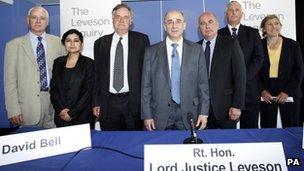Leveson media inquiry: Day-by-day guide to proceedings
- Published

The six members of the panel range from journalists and police officers to civil rights campaigners
Lord Leveson's inquiry into journalistic practices at London's Royal Courts of Justice will examine its culture and ethics, scrutinise media self-regulation, and hear from alleged phone-hacking victims.
Hearings are expected to last several months, with a report due within a year.
Here is a day-by-day snapshot of proceedings:
Day three - 16 Nov 2011
David Sherborne, the barrister representing 51 alleged victims of press intrusion, said the whole press stood in the dock
He said the press had a "self-serving agenda" and accused it of buying, stealing and making up stories
Mr Sherborne also said the experience of his clients was "primarily and largely" at the tabloid or popular end of the press but "it is the whole of the press that stands in the dock".
He added that "the victims who I represent don't want to stop proper investigative or public interest journalism. No-one sensibly does. But if the relationship between the public and the press needs to improve it needs to start now".
Mr Sherborne told the inquiry that one of his clients had said self-regulation by the Press Complaints Commission "is tantamount to handing the police station over to the Mafia".
Guardian editor Alan Rusbridger said it was important the inquiry looked at the 18 months after News International's "so-called rotten apple excuse" had exploded
The inquiry had previously heard claims that private investigator Glenn Mulcaire's notebooks suggested at least 28 News of the World journalists commissioned the investigator to hack phones. But Neil Garnham QC, representing Scotland Yard, said on Wednesday that police could not confirm all the 28 worked for the Sunday tabloid.
Day two - 15 Nov 2011
News International barrister Rhodri Davies QC apologised again for the News of the World's "shameful" phone hacking
He said News International supported self-regulation of the press
Associated Newspaper's barrister Jonathan Caplan QC told the inquiry it was unaware of any of its staff engaging in phone hacking
Mr Caplan said Associated Newspapers believed the Press Complaints Commission should be kept but strengthened
He stressed that all newspaper proprietors and publishers needed to be engaged in a self-regulation scheme
James Dingemans QC for Northern and Shell said the inquiry should look at regulation of the press elsewhere in the world
He said the company wanted a regulatory system that was entirely voluntary
Day one - 14 Nov 2011
Lord Justice Leveson said that freedom of the press was fundamental, but must be exercised with the rights of others in mind
He said his inquiry was about "who guards the guardians"
Lord Justice Leveson warned newspapers not to victimise inquiry witnesses who speak out against press intrusion
Counsel to the inquiry, Robert Jay QC, said notebooks belonging to private detective Glenn Mulcaire suggested he had hacked phones for the Sun and the Daily Mirror as well as the News of the World
Mr Jay questioned whether the public and politicians had lost faith in the Press Complaints Commission
Neil Garnham QC, the barrister for the Metropolitan Police and the Crown Prosecution Service, said the criminal investigation into phone hacking was unlikely to be completed before the inquiry publishes its report in September